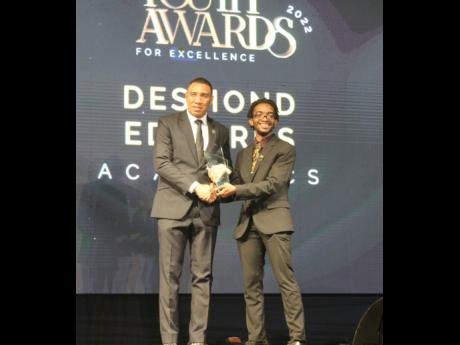Scholar Desmond Edwards inspired by his own illnesses
When the time came for the announcement of the awards at the Prime Minister’s National Youth Awards for Excellence on the lawns of Jamaica House on the evening of Saturday, February 4, Desmond Edwards was the first awardee to hit the stage. He was one of two in the category of academics.
That moment was just another of being first for this high academic achiever who spent his early years travelling to the Corporate Area for school daily and back to St Mary.
“Until we were able to find somewhere to stay in town (Kingston)…I remember getting dressed, brushing my teeth, washing my face, and just overall getting ready in the school parking lot so I could sleep on the journey over … . Because of these experiences, however, I grew up experiencing the duality of rural Jamaica and working on my father’s banana farm versus the hustle and bustle of city Kingston,” he told The Gleaner.
Notwithstanding all of that, Edwards got a government scholarship after completing his Grade Six Achievement Test to attend Campion College, which he attended up to 2018, when as captain he led Campion to its first School’s Challenge Quiz championship. He was also deputy head boy, a Big Brother Big Sister mentor, and sat on the executive boards of the Key and Chess clubs.
For his entire sojourn, Edwards was top of his class, especially in biology, French, Caribbean and communication studies. At the end of that journey he was named valedictorian and received the Principal’s Award for Most Outstanding Student.
His academic prowess transcended Campion, as he obtained grade ones in nine CSEC subjects and six CAPE units. That achievement catapulted him to university in the US.
Through a fully funded scholarship he earned two Bachelor of Science degrees in Biological Engineering and Biology, and a minor in French from the Massachusetts Institute of Technology, where he was in the top one per cent of students, with a GPA of 5.0.
He left the Ivy League institution, located in Cambridge, Massachusetts, also with the 2022 Peter and Sharon Fiekowsky Award (teaching), the 2022 Outstanding School of Science UROP Student Award (research), the 2022 Ned Holt Prize (scholarship and community service), and the 2021 Whitehead Prize (academics and research).
In 2019, he copped the Peter J. Eloranta Summer Undergraduate Research Fellowship for “novel, interesting, and independent research”, and was a member of the Phi Beta Kappa and Tau Beta Pi honour societies, and Laureates and Leaders Class of 2022 cohort. He was a tutor, a teaching assistant, and a LEAH Knox Scholars mentor. He held several leadership roles, through which he provided mentorship to new members “to orient them with the unfamiliar biotech industry”.
The scholarships kept rolling in, and now Edwards is a recipient of a National Science Foundation Graduate Research Fellowship and a Knight-Hennessy scholarship. Since September last year, he has been pursuing a Doctor of Philosophy degree in Microbiology and Immunology at Stanford University, to which he returned a day after speaking with The Gleaner.
“I am broadly interested in infectious diseases and how pathogens interact with our bodies once we become infected. We can think about this like the interaction between the army and an attacking force, where the army represents the defences that our bodies raise to protect us from getting sick, while the attacking force are the invaders – the pathogens – that want to get into our bodies and make us sick. I am interested in understanding the strategies that both sides use to fight against each other and what happens when they go head-to-head,” he shared with The Gleaner.
Edwards says he wants “to lead a career that blends academic research as a professor with public policy and education and outreach, creating teaching and mentorship opportunities for upcoming generations to engage and become enthralled with pursuing STEM- and STEM research-related careers”. This interest, he said, was inspired by his own “health troubles”, which started before he was born. The “forced C-section baby” said he “was extremely sickly” and was diagnosed with severe asthma at age two.
“My asthma attacks were violent, sudden, and long-lasting. I also suffered from persistent infections, from hospitalisation-inducing gastroenteritis to asthma-enhanced flus, to dengue and chikungunya,” he shared.
“This, however, marked the beginning of my interest in a scientific career. Spending all that time with doctors and on all different kinds of medications, I naturally started to become interested in understanding what was happening to me and why all these colourful liquids and pills would often make me feel better. As I got older and continued to pursue science throughout school, it became clearer and clearer that scientific research would be the best way for me to realise my vision.”

